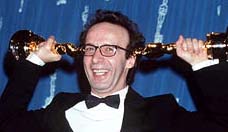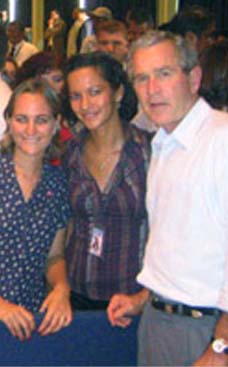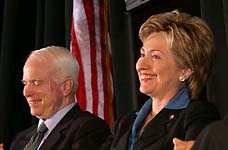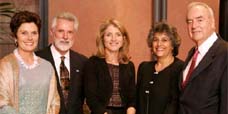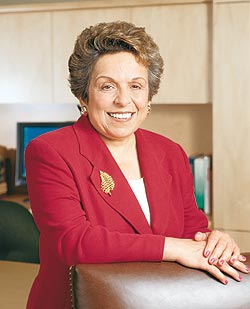
Donna Shalala, now president of the University of Miami, has played a role in some of the hottest controversies of our time, including race, censorship, healthcare, welfare, and education. She has made significant incremental improvements while winning the admiration of many political opponents. University of Miami President and former Clinton Cabinet member Donna Shalala served as a Peace Corps Volunteer in Iran in the 1960's.
Donna Shalala: A Whirlwind's Winning Ways
A Whirlwind's Winning Ways
By Kim Clark
In 1988, as one of her first acts as the new chancellor of the University of Wisconsin-Madison, Donna Shalala convened a get-to-know-you meeting with student government leaders. Suddenly, the meeting was crashed by Black Student Union leaders angry about the tiny share of minorities in the student and faculty population as well as offensive actions by some fraternity members.
advertisement
Web Extras
Q & A: More with Donna Shalala
America's Best Leaders
"Chancellor Shalala, you have a major issue with the racial climate here!" thundered Charles Holley, co-president of the BSU.
"Charles Holley, I know who you are. I know we have a problem. And we are going to do something about it," Shalala calmly replied, defusing tensions. Holley says Shalala really impressed him when the 5-foot-tall daughter of Lebanese immigrants then gave him a perfectly authentic soul handshake. "As my grandfather would say, you could tell she had been out after dark," Holley says, laughing.
Unfortunately, Shalala's attempts to solve the racial tensions created as much controversy as results. Conservatives attacked her as the "high priestess of political correctness." Liberals were disappointed that by the time she left the school to become the secretary of health and human services for the Clinton administration, the percentage of minority students had risen from 5.7 to only 8 percent. But both sides praise Shalala's people and leadership skills. "If being a leader is bringing energy, commitment, and focus to an issue," says Holley, "she definitely does that."
Conflict. Shalala, now president of the University of Miami, has played a role in some of the hottest controversies of our time, including race, censorship, healthcare, welfare, and education. She has made significant incremental improvements while winning the admiration of many political opponents.
When, in late 2000, the University of Miami announced that it had chosen Shalala to be its leader, Mario Diaz-Balart, then a conservative Republican state representative, publicly worried that the liberal Democrat wouldn't be able to win crucial government grants in Republican-led state and federal governments. But Diaz-Balart, now in Congress, says he has become "one of her biggest fans. . . . She is a great listener. She cherishes Miami's diversity. She has gained acceptance by everyone and done a spectacular job."
Shalala seemed destined to run something from the start. There was the time a tornado hit her hometown of Cleveland. While the family rushed to the cellar, 10-year-old Donna ran to the street to direct traffic. Early on, she also showed a remarkable persistence and ability to charm VIP s. When, in the summer of 1951, the college student who was coaching the local Annie Oakleys softball team wouldn't let Donna play first base, she bugged him until he gave in. "What she lacked in size," recalls the coach, one George Steinbrenner, "she made up for in feistiness."
Fast friend. The Boss is just one of a remarkable collection of celebrities and power brokers whom Shalala can count as friends.
But she has also gathered hundreds of nonfamous people into her orbit. When the daughter of her former Washington hairdresser, evacuated from Tulane University, had trouble continuing her studies at the University of Maryland, Shalala helped her get into courses. Shalala "has goodness of heart," says the hairdresser, Ury Emsellem.
Shalala also has such supreme confidence in her abilities that her friend Gloria Steinem once called her "pathologically secure." After serving in Iran as a Peace Corps volunteer, then getting a Ph.D. in political science and economics, Shalala applied to the New York Times. The Gray Lady declined, but Shalala quickly won a tenured position at Columbia.
advertisement
Web Extras
Q & A: More with Donna Shalala
America's Best Leaders
Her academic expertise in municipal finance put her under the tutelage of a man she now says was one of her most important mentors: Wall Street icon Felix Rohatyn. As a member of his Municipal Assistance Corp., Shalala watched in awe as Rohatyn persuaded unions, bankers, and politicians to absorb financial pain for the greater good of saving New York City. "He got Democrats and Republicans together and . . . saved New York City," Shalala says. "He made the impossible possible."
Shalala learned that achieving the possible could be plenty hard enough when, a few years later, Jimmy Carter put her in charge of developing policy for the Department of Housing and Urban Development. "Political scientists think of government as something that could be explained. But I learned it was more personal and messier than the literature" indicated, Shalala says now. She was surprised at how much faster government moved than academia. "Everybody was trying to take my responsibility away from me all the time," she recalls. The pressure got so bad that she sometimes cried herself to sleep. But "I learned to be nimble and to protect myself," she says.
Playmaker. A few years later, at Wisconsin, she confronted a dicey racial situation. To respond quickly, she supported most of a plan that a committee had already drafted. The move drew fire, however, from those concerned that rules against demeaning students would stifle free speech. A judge eventually threw out the speech code as unconstitutionally broad. Shalala had more success in reviving the school's athletics department. When she arrived, the program was losing about $1 million a year because of flagging attendance at football games. So Shalala fired the athletic director and relentlessly courted former Badger and NFL receiver Pat Richter until he agreed to take the job. Soon the department was making money, and the football team was headed to the Rose Bowl.
Shalala's tenure atop the Department of Health and Human Services was marked by similar controversies, disappointments, and successes. She was shut out of the planning for health reform. Then she was put in charge of the Clinton attempt at welfare reform. Although she had gathered a cadre of experts to develop a widely praised plan, her proposal was tossed in favor of more-punitive Republican-backed reforms. Three of her top welfare aides resigned in protest.
But Shalala salvaged some of her ideas. She got her demoralized staff to focus on incremental improvements, like programs that provided health insurance and vaccines for low-income children.
Her victories, however, were sometimes drowned out by headlines of more dramatic incidents. For one, Shalala discounted early rumors that President Clinton had been having an affair with an intern. When it turned out the rumors were true, she was deeply embarrassed. She still won't discuss the dressing-down she reportedly gave the president but says she is ever more convinced that "leadership is all about judgment and character."
Another was a personal triumph. At 7:15 a.m. on Sunday, March 7, 1999, Shalala went to an ATM near her Washington home in the tony Georgetown neighborhood. A man grabbed her and ordered her to "give it up." In a move she does not recommend to others, she instinctively yelled. She says she bent over to protect herself. The would-be robber, alarmed, jumped in a car and drove away. Shalala memorized the license plate and called the police, who made an arrest. At work, her staff applauded her. "The employees were tickled," she says.
advertisement
Web Extras
Q & A: More with Donna Shalala
America's Best Leaders
Shalala regrets the missed opportunity to fix the nation's healthcare system but says now that perhaps no strategy would have worked. "Every issue has its timing. I don't think the issue was ripe. Sometimes systems have to collapse" before the public and leaders will back serious reform.
When she wrapped up her tenure at HHS, Shalala retained plenty of goodwill. Harvard Prof. Mary Jo Bane, who resigned rather than implement the bill that Clinton signed, still recalls Shalala with fondness. Shalala wasn't afraid to hire the smartest experts in every field and give them plenty of autonomy, Bane says. "She relied on us" to make decisions. "In Washington, people in authority will throw you to the wolves, but Donna never did that. If we made mistakes, she'd talk about it, but she would back you up," Bane says. "She was terrific to work for." Rep. John Dingell, a Michigan Democrat who had been extremely critical of the Clintons' bungling of health insurance, says, "She did everything she could do under the circumstances . . . and left Washington with friends," a rare accomplishment.
She has turned those friends to good use at the University of Miami. After five years of serving on the board of Lennar Corp., Shalala just collected a whopping $100 million donation for the University of Miami's medical school from the family of the company founder. Her good relations with local politicians helped seal a land swap that will enable the university to build a new bioscience center. She has also embarked on building new student apartments to give the commuter-heavy campus more of a residential feel. But she insists that the new buildings will not be her main legacy. Rather, it will be an improved university, with better faculty and students. "I make institutions better," Shalala says. "That's what I do for a living."
